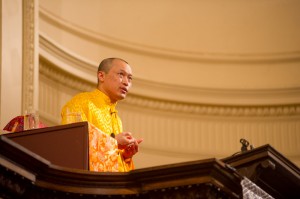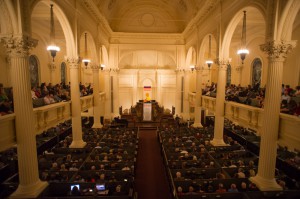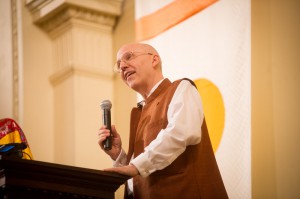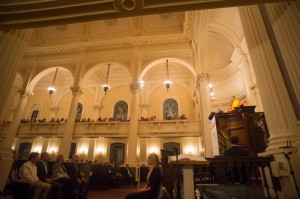Apr 12
Saturday
Featured Stories
Strength in Vulnerability
2 Comments
April 12, 2014 – 10:18 pm |
Permalink |

Finding Basic Goodness in the Aftermath of Violence
article by Lassiter Williams
photos by Maureen Cotton
On a balmy evening in Spring, nearly one year after the bombing of the Boston Marathon, the Sakyong came to the city with a message entitled “Moving Forward: Boston Strong in Everyday Life.” With the promise of inspirational words and guidance at a difficult time, over 500 people came to the Arlington Street Church and were welcomed into the gracious, high-ceilinged venue with cheerful friendliness.
The church, home to a Unitarian congregation, was an appropriate location for the delivery of the Sakyong’s message. In 1982, it hosted the Sakyong’s father, Chogyam Trungpa Rinpoche, for a talk on creating enlightened society. More recently, it opened its doors as a sanctuary for those suffering in the days directly after the bombings.

There was an air of warm anticipation leading up to the beginning of the Sakyong’s talk. The aisles of the church were filled with the chatter of friends greeting friends, and despite the grimness of the anniversary being marked, there was a sense of confidence in the the Sakyong’s ability to deliver a message of uplift and hope. When it was time for the talk to begin, the Sakyong entered quietly through a side door, climbed to the top of the impressive pulpit where his throne had been placed and bade the audience to be seated with a smile.

After an introduction by President Reoch, the Sakyong began by speaking of the day of the bombing and sharing in the shock and grief felt by the most of the world. He had run in the marathon himself a few years earlier and recognized it as being more than just an athletic event. He described it as a demonstration of humanity coming together in goodness, purity and excellence. His own contemplation on that day brought him to the difficult question of how to respond when such good qualities are shattered by unspeakable acts of violence.
This was the message that everyone in the audience had come to hear, seeking to mitigate a loss so great it threatened the very ground we stand on and our identities as individuals as well as a society. He started out by acknowledging the inclination towards revenge and animosity, and, as expected, offered an alternative—but it was not an easy alternative, and this is where the message began to become a gentle challenge.
In the aftermath of crisis and trauma, when the unthinkable has occurred, a space opens up. The Sakyong explained that shock can dissipate speed and discursiveness, and suddenly, we are presented with the opportunity to fully experience the fragility of life and know our own vulnerability. This is not an easy thing to do, and our culture is inclined against it. Our idea of strength is one in which is heart and mind are kept separate, action is divorced from feeling and softness is mistaken for weakness.

But the Sakyong asked us to understand this vulnerability and softness in a different way and to begin to understand the strength of it. It is difficult contemplation that begins with how we feel about ourselves and extends outward until we are addressing the state of society at large. He acknowledged that this can be overwhelming, and the fallback is often “What can I do? How can one thought make a difference in a world where such atrocities occur?” His reply was that everything begins with one thought which builds on another until a belief is formed. Then, one person’s beliefs build on another person’s belief until an entire social paradigm is formed. This is how we find ourselves at what the Sakyong described as a crossroads.
The shock and horror of an event like the marathon bombing brings us to a standstill in which we are forced to ask, “What am I?,” “What are we?” and “Where are we going?” The Sakyong’s gentle challenge offered to us in his message of forward motion and strength is to stand at these crossroads, fully occupy the moment of ultimate vulnerability, and be willing to move forward with a continued belief in the basic goodness of ourselves and society.
He went on to say that these principles don’t belong only in houses of worship or shrine rooms to be shared only amongst friends and familiars. It became clear throughout the rest of his talk that the gathering in the Arlington Street Church was a sign of hope in a dark time, but more importantly, it was a starting point.
The Sakyong closed the evening by telling us that he will do everything he can, but he can’t do it all. We all have to take responsibility and engage in the transformation of our culture. He warned us that it’s not easy, and even if we are willing to take on the challenge, it won’t lead to a perfect world. But we can begin by recognizing the strength of our own vulnerability, our innate human softness. From there, we extend outward, one person at a time if necessary, until we touch the basic goodness of society.
~~
For more information on Moving Forward: Boston Strong in Everyday Life, visit the event’s site.









Apr 15, 2014
Reply
Well written Lassiter! Sometimes its hard for me to find the pith of his talks, but you captured it here. Thank you!
Apr 15, 2014
Reply
Thank you for the article. A wonderful summation of the talk. I learned from it.